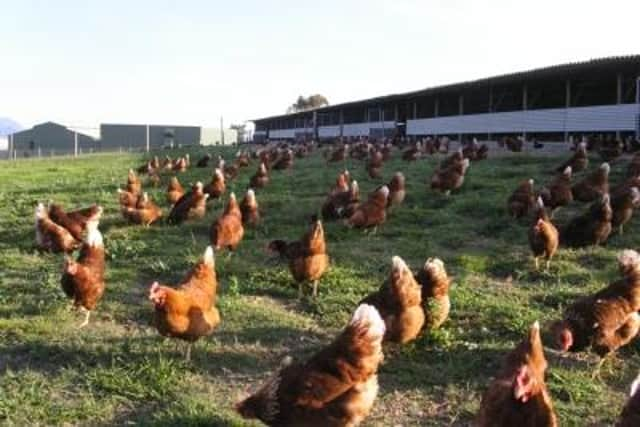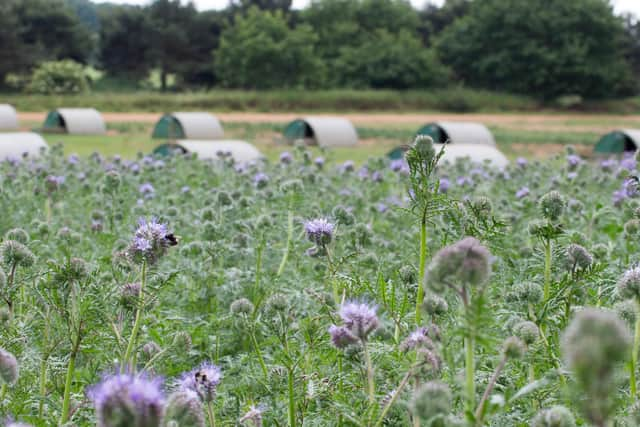Factory farming must end if the world is to tackle climate change and meet United Nations' Sustainable Development Goals – Philip J Lymbery


However, one human lifetime ago, things changed dramatically: farming became dominated by industrial agriculture.
Farmed animals were separated from the land, put into darkened sheds, where they were caged, crammed and confined. Crops started to be grown in monocultures using artificial fertilisers and chemical pesticides. Nature was swept away.
Advertisement
Hide AdAdvertisement
Hide AdHalf a century on and we are starting to realise how that shift has had serious unintended consequences.
A new report by Chatham House, Food System Impacts on Biodiversity Loss, launched in partnership with the United Nations Environment Programme and Compassion in World Farming, shows so clearly that intensification of agriculture has decimated wildlife and is affecting our ability to grow food in the future.
The report finds that food is “the primary driver” of biodiversity loss, with agriculture alone threatening 86 per cent of species deemed to be at risk of extinction. It sets out the three main steps that must be taken to help combat biodiversity loss and climate change:
Our global diet patterns must change to include more plant-based foods and less food waste. More land must be set aside for nature rather than being converted for agriculture. We must farm in a more nature-friendly way that supports biodiversity.
Industrial agriculture is also the biggest cause of animal cruelty on the planet. And now it is recognised as a serious pandemic risk too, with factory farms creating the perfect breeding ground for new and dangerous strains of disease.


Far from sparing land for nature, the reality of intensive farming is that farmland continues to expand, encroaching on the world’s last remaining wild lands. Sustainable intensification is a myth.
Vast acreages of precious arable land have to be devoted to growing feed for confined farmed animals. Globally, 40 per cent of our entire grain harvest is fed to industrially reared animals. If fed directly to people, it could sustain an extra four billion of us. Yet, as animal ‘feed’, much of the food value is lost, in terms of both calories and protein.
Our own future and all life on our planet depends on us making peace with nature.
Advertisement
Hide AdAdvertisement
Hide AdHow to change is increasingly seen as reconnecting food production and nature through regenerative, agro-ecological farming combined with more balanced diets, eating more plants and less and better meat from nature-friendly farms where, as sentient beings, animals can move freely and experience the joy of life. Where they can be mixed in rotation with crops grown using natural predators and disease control instead of chemicals and drugs. Where manures fertilise the ground, turning dirt into soil.
The big question is, how do we get there, and fast?
Well, there couldn't be a better time. The challenge of Covid-19 has shown humanity is capable of speedy and significant change. That we can work together to protect one another and our health systems, and that whilst scientists develop vaccines, governments can develop the urgent fiscal packages necessary to support our economies.
The answer lies in strong alignment, with all of us playing our part: business, finance, governments, the UN and civil society, working in partnership to transform the food system.
It lies in food companies setting measurable targets for the reduction of livestock products, shunning those from the factory farm altogether and diversifying protein offerings into plant-based, fermentation and cellular meat alternatives.
It lies in the financial sector ensuring that agricultural funding is only available to support the transition toward nature-positive practices.
It lies in governments creating policy environments for change, using directives, incentives and subsidies to steer food and farming to this new nature-friendly era.
The opportunities for greening food production are enormous. Take subsidies: globally, governments provide $700 billion (about £490 billion) a year in farm subsidies, more than $1 million per minute, much of which currently drives the climate crisis and destruction of wildlife.
That money could be far better spent redirecting it towards regenerative farming and reducing demand for meat. The tax system could be employed to power the transition away from diets heavy in industrially produced meat. Taxes could be levied on factory-farmed meat. Tax revenue could then offset the cost of healthy, sustainable foods, making them more affordable for all.
Advertisement
Hide AdAdvertisement
Hide AdGreening food production and managing food demand are crucial for meeting the United Nation’s 2030 Sustainable Development Goals agenda.
We therefore need an overarching narrative, a United Nations global agreement on food. One that recognises food’s central role in the success of existing conventions such as on climate and biodiversity.
This year presents a crucial opportunity to bring about significant changes to the way our global food systems work – changes that are long overdue and that will help deliver progress on all 17 of the global Sustainable Development Goals (SDGs) set by the UN. This September will see the first ever UN Food Systems Summit take place with the aim of bringing together world leaders to act on this vital issue.
We must make sure our leaders understand that without an end to factory farming, and a move to less and better meat consumption, the world cannot realise the Sustainable Development Goals nor the Paris Climate Change targets.
In short, we need to seize the opportunity of this year’s UN Food Systems Summit to move toward a global agreement to end factory farming. To reset our food system toward farming with nature, not against her. A food system transformation that is best for animals, for people and for the planet.
For all our sakes, for millennia to come.
Philip J Lymbery is global CEO of Compassion in World Farming and United Nations Food Systems Champion
A message from the Editor:
Thank you for reading this article. We're more reliant on your support than ever as the shift in consumer habits brought about by coronavirus impacts our advertisers.
If you haven't already, please consider supporting our trusted, fact-checked journalism by taking out a digital subscription.
Comments
Want to join the conversation? Please or to comment on this article.
